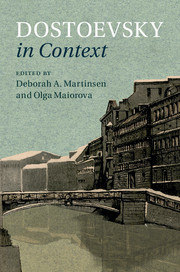Book contents
- Frontmatter
- Contents
- List of illustrations
- Notes on contributors
- Acknowledgments
- Note on citation, transliteration, glossary, and dates
- Chronology
- 1 Introduction: the many worlds of Dostoevsky
- PART I SOCIAL, HISTORICAL, AND CULTURAL CONTEXTS
- i CHANGING POLITICAL, ECONOMIC, AND SOCIAL LANDSCAPE
- ii POLITICAL, SOCIAL, AND CULTURAL INSTITUTIONS
- 9 Russian monarchy and the people
- 10 Empire
- 11 Service ranks
- 12 Education
- 13 Science, technology, and medicine
- 14 Jews, race, and biology
- 15 Suicide
- 16 Children
- 17 Gambling
- iii SPACE AND PLACE
- iv RELIGION AND MODERNITY
- PART II LITERATURE, JOURNALISM, AND LANGUAGES
- Glossary
- Further reading
- Index
- References
9 - Russian monarchy and the people
from ii - POLITICAL, SOCIAL, AND CULTURAL INSTITUTIONS
Published online by Cambridge University Press: 18 December 2015
- Frontmatter
- Contents
- List of illustrations
- Notes on contributors
- Acknowledgments
- Note on citation, transliteration, glossary, and dates
- Chronology
- 1 Introduction: the many worlds of Dostoevsky
- PART I SOCIAL, HISTORICAL, AND CULTURAL CONTEXTS
- i CHANGING POLITICAL, ECONOMIC, AND SOCIAL LANDSCAPE
- ii POLITICAL, SOCIAL, AND CULTURAL INSTITUTIONS
- 9 Russian monarchy and the people
- 10 Empire
- 11 Service ranks
- 12 Education
- 13 Science, technology, and medicine
- 14 Jews, race, and biology
- 15 Suicide
- 16 Children
- 17 Gambling
- iii SPACE AND PLACE
- iv RELIGION AND MODERNITY
- PART II LITERATURE, JOURNALISM, AND LANGUAGES
- Glossary
- Further reading
- Index
- References
Summary
“The people will be fully cured only where the monarch will apprehend his highest significance – to be an image on earth of the One Who Himself is love.”
Nikolai Gogol, 1847When Alexander II (1855–81) ascended the Russian throne in February, 1855, he assumed the power of absolute monarch in a state that had been established in the early eighteenth century by Peter the Great (1682–1725) on the model of European monarchies and modified by his successors since then. At the moment of Alexander II's accession, the central governmental institutions consisted of a system of ministries, a State Council that assigned legislative functions, and a Senate concerned principally with legal matters. The Committee of Ministers, the state's supreme executive institution, coordinated the ministries. It resembled a Cabinet, but lacked a Prime Minister, a key figure to chair a government of ministers dedicated to a united policy. Whereas monarchies like Prussia and Austria utilized chancellors to direct the ruler's policy, in the Russian empire such an option was precluded by the autocrat's jealousy of power. Rather, the sovereign dealt individually with each minister, playing them off against each other, thus forestalling the development of institutional solidarities that might counter his will.
To reinforce the monarch's absolute power, the Imperial Court elevated the image of the Russian monarch, representing him as a transcendent, heroic figure, standing above institutions, capable of transforming them using his superior reason and power. While Alexander II's uncle Alexander I (1801–25), who established the system of ministries, had envisioned a transition into a type of representative government, wars against Napoleon and Alexander's absorption with pietistic religion left these hopes unfulfilled. After the Decembrist* uprising in 1825, Nicholas I (1825–55) introduced a new narrative presenting autocratic rule as Russia's national heritage: the failure of the Decembrists demonstrated the Russian people's love for their monarch, which set the monarchy apart from European states afflicted with representative institutions. The decrees and manifestos of his reign incorporated the word narodnost’ (nationality) into the official lexicon, expressing a monarchical spirit presumably endemic to the Russian people.
In 1833, the ideology of “official nationality,” which introduced the slogan “Orthodoxy, Autocracy, Nationality*” (pravoslavie, samoderzhavie, narodnost’), was formulated in a circular of Sergei Uvarov, then acting Minister of Education. Autocracy, samoderzhavie, was the doctrine's centerpiece.
- Type
- Chapter
- Information
- Dostoevsky in Context , pp. 77 - 85Publisher: Cambridge University PressPrint publication year: 2016

